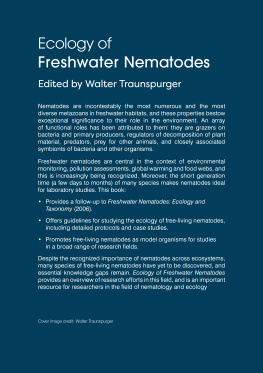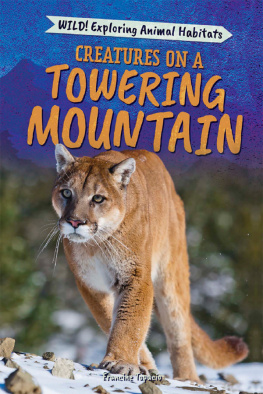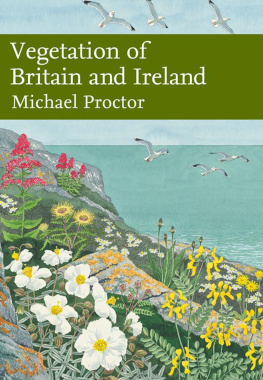
Ecological Investigations
These investigations identify and clarify some basic assumptions and methodological principles involved in ecological explanations of plant associations. How are plants geographically distributed into characteristic groups? What are the basic conditions that organize groups of interspecific plant populations that are characteristic of particular kinds of habitats? Answers to these questions concerning the geographical distribution of plants in late 19th century European plant geography and early 20th century American plant ecology can be distinguished according to differing logical assumptions concerning the habitats of plant associations. Through an analysis of several significant case studies in the early history of plant ecology, Konopka distinguishes a logic of habitats that conceives of plant associations through an analogy with individual organisms from a logic in which plant associations have a reciprocal relation to habitat physiography. He argues that a phenomenological conception of the logical attributes of habitats can philosophically complement the physiographic tradition in early plant ecology and provide an attractive alternative to standard reductionism and holism debates that persist today. This wide ranging and original analysis will be valuable for readers interested in the history and philosophy of ecology.
Adam C. Konopka teaches in the philosophy department at Xavier University in Cincinnati, Ohio (USA). His research interests are primarily in phenomenology and the philosophy of science. He has published several articles in journals such as the New Yearbook in Phenomenology and Phenomenological Philosophy , Ethics , Policy , Environment , and Environmental Ethics.
History and Philosophy of Biology
Series Editor: Rasmus Grnfeldt Winther is Associate Professor of Philosophy at the University of California, Santa Cruz (UCSC).
This series explores significant developments in the life sciences from historical and philosophical perspectives. Historical episodes include Aristotelian biology, Greek and Islamic biology and medicine, Renaissance biology, natural history, Darwinian evolution, nineteenth-century physiology and cell theory, twentieth-century genetics, ecology, and systematics, and the biological theories and practices of non-Western perspectives. Philosophical topics include individuality, reductionism and holism, fitness, levels of selection, mechanism and teleology, and the nature-nurture debates, as well as explanation, confirmation, inference, experiment, scientific practice, and models and theories vis--vis the biological sciences.
Authors are also invited to inquire into the and of this series. How has, does, and will the history of biology impact philosophical understandings of life? How can philosophy help us analyze the historical contingency of, and structural constraints on, scientific knowledge about biological processes and systems? In probing the interweaving of history and philosophy of biology, scholarly investigation could usefully turn to values, power, and potential future uses and abuses of biological knowledge.
The scientific scope of the series includes evolutionary theory, environmental sciences, genomics, molecular biology, systems biology, biotechnology, biomedicine, race and ethnicity, and sex and gender. These areas of the biological sciences are not silos, and tracking their impact on other sciences such as psychology, economics, and sociology, and the behavioral and human sciences more generally, is also within the purview of this series.
Philosophy of Biology Before Biology
Edited by Ccilia Bognon-Kss & Charles T. Wolfe
Ecological Investigations
A Phenomenology of Habitats
Adam C. Konopka
For more information about this series, please visit: https://www.routledge.com/History-and-Philosophy-of-Biology/book-series/HAPB
Ecological Investigations
A Phenomenology of Habitats
Adam C. Konopka
First published 2020
by Routledge
2 Park Square, Milton Park, Abingdon, Oxon OX14 4RN
and by Routledge
52 Vanderbilt Avenue, New York, NY 10017
Routledge is an imprint of the Taylor & Francis Group, an informa business
2020 Adam C. Konopka
The right of Adam C. Konopka to be identified as author of this work has been asserted by him in accordance with sections 77 and 78 of the Copyright, Designs and Patents Act 1988.
All rights reserved. No part of this book may be reprinted or reproduced or utilised in any form or by any electronic, mechanical, or other means, now known or hereafter invented, including photocopying and recording, or in any information storage or retrieval system, without permission in writing from the publishers.
Trademark notice : Product or corporate names may be trademarks or registered trademarks, and are used only for identification and explanation without intent to infringe.
British Library Cataloguing-in-Publication Data
A catalogue record for this book is available from the British Library
Library of Congress Cataloging-in-Publication Data
Names: Konopka, Adam, author.
Title: Ecological investigations: a phenomenology of habitats / Adam C. Konopka.
Description: Milton Park, Abingdon, Oxon; New York, NY: Routledge, 2020. |
Series: History and philosophy of biology | Includes bibliographical references and index.
Identifiers: LCCN 2019017795 | ISBN 9781138300378 (hbk) | ISBN 9780203733523 (ebk)
Subjects: LCSH: Plant ecologyAmericaHistory20th century. | Plant ecologyEuropeHistory19th century. | BiogeographyAmericaHistory20th century. | BiogeographyEuropeHistory19th century.
Classification: LCC QK109 .K66 2020 | DDC 581.7dc23
LC record available at https://lccn.loc.gov/2019017795
ISBN: 978-1-138-30037-8 (hbk)
ISBN: 978-0-203-73352-3 (ebk)
Typeset in Times New Roman
by Deanta Global Publishing Services, Chennai, India
For Louis-Michael, Devon Haskell, and Judy Ramona
I would like to acknowledge the support that made this work possible. This book was written while I held a visiting position at Xavier University in Cincinnati, Ohio, that afforded a generous research schedule and an opportunity to teach small undergraduate seminars. I am thankful to the students of these seminars for their collaboration in the learning process and for the hospitality of Xaviers philosophy department. I have also worked through these investigations at meetings of the Husserl Circle, Society of Phenomenological and Existential Philosophy, University of Kentucky Philosophy Department, Phenomenology Research Group at Loyola University Chicago, and International Association for Environmental Philosophy. I received valuable feedback and helpful direction from colleagues at the meetings of these organizations. This work was also stimulated by conversations with several colleagues, especially Charles S. Brown, Tim Brownlee, Brett Buchanan, Sam Cocks, John Drummond, Gabe Gottlieb, Hanne Jacobs, Bob Sandmeyer, Kathleen Smythe, Mike Sontag, David Story, and Ron White. Richard Polt and Dan Dwyer read a draft of the manuscript and provided helpful comments and feedback. This work was also supported through personal relationships with my family and friends. I would like to thank my wife, Erica, for her inspiration and loving support and my children Louis-Michael, Devon Haskell, and Judy Ramona for sharing their sense of wonder for the natural world with me.













